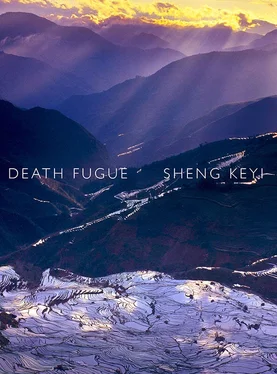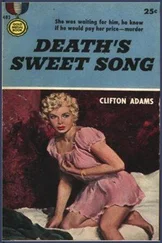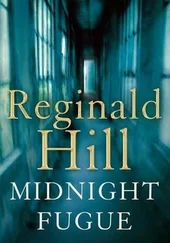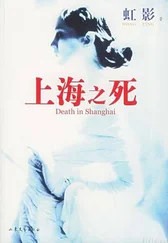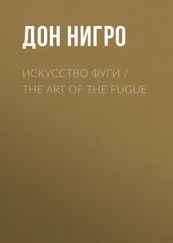‘But this is policy. It’s all according to regulation.’ Juli picked a flower and placed it behind her ear. ‘Of course, it’s also what the people want.’
Seeing Juli’s feminine gesture, Mengliu felt that her serious tone was basically just a pretence.
‘The government is subjective. They don’t care about what people want.’ He looked at the brilliant wildflower behind Juli’s ear. It struck him that it would soon wither, and he felt pity for it.
‘Everything is free. What benefit could the government possibly have?’ Juli stared at him with a taunting attitude.
‘…What I mean is, simply put, it may not be quite what it appears on the surface. Furthermore, fifty years, just as a person’s in his prime…’
Mengliu hesitated. Suddenly coming to a realisation, he said to himself, ‘No wonder I only see young people here. The middle-aged have already been shut away in nursing homes. Don’t they have any interest in the outside world anymore? Don’t they come out and have a look around?’
‘There’s a small self-contained community in there,’ Juli said, ignoring Mengliu. Turning her head, she looked fondly and longingly at the nursing home. ‘Inside, there will one day be a famous old craftswoman, creating strange and wondrous things — and that will be me.’
Mengliu climbed a few steps further up the rock, searching for a better angle from which to see more clearly, but all he could see was the outer wall surrounding the nursing home, blocking the view as effectively as if it were the Great Wall. He saw the old trees, the flying eaves, the waterfall and path, and the tower that seemed to disappear into the sky. Silence glided over the walls from the garden, and came to rest in the mysterious forest behind them.
18
Cycling to the suburbs was Mengliu’s idea. He said that people in love should not miss out on the spring, and he persuaded Qizi to put down her physics books and relax for a while. At dawn, they ate fritters, soya milk, steamed buns and porridge, then took a pair of bicycles and set out through the bleary-eyed city to visit its outskirts. An hour and a half later, the thick white smoke released from the chimney at the brewery had turned to a thin wisp. The bustle of the city was blown away by the country air. The cycle path was covered with crushed black coke and the broken chips of red bricks. The two mingled colours resembled an abstract painting. As their bicycle wheels rolled over the path, they made a crunching sound. All around them were crops, vegetable patches, ponds, bamboo, birds in flight, animals and people, with smoke on the rooftops and the yelping dogs serving only to emphasise the silence of the countryside when their echoes reverberated over the scene.
Happily humming schoolyard folk songs, in what seemed like the space of a breath they had cycled more than ten kilometres. They stopped at a roadside farmstead and asked for a drink of water. They chatted with some wrinkled old plowmen, and saw from their expressions that they envied the young couple their youth and knowledge, and love. Qizi’s face was like an apple at the end of autumn, flushed with a healthy rosy glow. Among the villagers were some who had travelled to the city and seen the crowds of people on the street. They were curious and eager to find out more as they sat smoking their morning pipes, one leg crossed over the other or a grandchild tucked between their knees. They talked about the city as if it were a completely different world.
Mengliu and Qizi answered them perfunctorily. Then, after expressing their thanks, they continued on their journey.
The pair now fell silent. The grinding of their bikes on the gravel became monotonous, and each felt the other’s anxiety.
They had thrown aside their work, given up a wonderful play, rejected invitations to salon gatherings and parties, and at last they were experiencing a moment of freedom and beauty and tranquility. Neither of them wanted to destroy this unique opportunity. Their legs continued to pedal mechanically, perpetuating the crunching sound and advancing their journey. They stopped at what might have been an abandoned watchtower or church. Putting their bikes to one side, they gazed upward for a minute. Holding hands, they entered the building and were overwhelmed by the pungent smell of manure. They realised that the building was home to a tied-up water buffalo. It stood chewing on feed, staring at the intruders with red eyes as big as the rims of cups. They went up a rickety wooden staircase that had been reinforced with hemp ropes, and climbed right up to the third floor. As they climbed, the staircase shook badly, throwing off a lot of dust. They kept climbing, quivering all the way to the top.
The building was empty except for the water buffalo downstairs. Through the windows they saw the village they had cycled through. Neither of them knew why they had wanted to go up to the top, but there they stood, inside the dilapidated building, facing one another.
Mengliu kissed Qizi extravagantly, but even with his most dazzling gestures he could not move her. She wasn’t in the least bit confused. Her expression was sober, her eyes misty, and there was some sadness in her smile. She put her hands on Mengliu’s chest and slowly pushed him away, saying, ‘There’s a demonstration this afternoon. We should get back.’
Mengliu, burnt by her expression, suffered a moment of heartache. She was an intelligent girl. He was becoming more and more aware of that.
‘Let’s take a break first. We’ll find a farmhouse where we can scrounge a meal. We’ll fill our stomachs and then make a decision, is that okay?’
She was obviously a little tired. Leaning against him, she said in a soft voice, ‘I love you.’ He kissed her again, this time plainly and passionately, and he got more of a response. She returned his kiss, and he felt her melt in his arms, as if she were about to flow right out of his grip. He pulled her into a tighter embrace, feeling himself to be an infinite chamber, able to furnish her body, and her life, with riches.
After some time, she raised her head from where it lay on his chest and said, ‘I know you’re concerned about the Unity Party business. Hei Chun was right, we all have a responsibility. Escaping is cowardice.’
Her words pierced Mengliu like nails, setting off a burst of misgivings. He turned to the window and looked out across the distant assortment of trees, flowers and farmhouses with a frown.
She leaned lightly against his back and said, ‘None of us knows what kind of feathers we wear, but at least we can make them as brilliant as possible.’
He turned around. Her eyes seemed to have been washed clean by the pristine countryside. They were emitting a strange glow.
‘So you want to forget about going overseas?’
She thought for a moment, then nodded in agreement.
‘You won’t regret it?’
She looked at him and said resolutely, ‘I won’t regret it. I want to be with you.’
He suddenly felt that her strength was propelling him toward the sunlight, and he felt bright and clear. Yet there was still a part of him covered in shadows. He knew that he was the only one who could drive the shadows away. He asked himself, Does it have to be like this? but he could not come up with an answer.
When they reached the city, the demonstrators had arrived in Beiping from everywhere.
Mengliu stood astride his bike on the side of the road, drooping as if he had been drenched in heavy rain. He hunched his body down, hands on the handlebars, and drew his neck into his shoulders, as
if the rain were unbearable.
Qizi leaned her bike against the trunk of a tree. As she looked down the road, her expression was the same as Mengliu’s.
They saw Hei Chun directing the contingents of demonstrators, with a strip of fabric tied around his head. He was full of energy, and resembled a revolutionary from a film as he swaggered in front of the slogans on the banners that fluttered in the wind like flags.
Читать дальше
